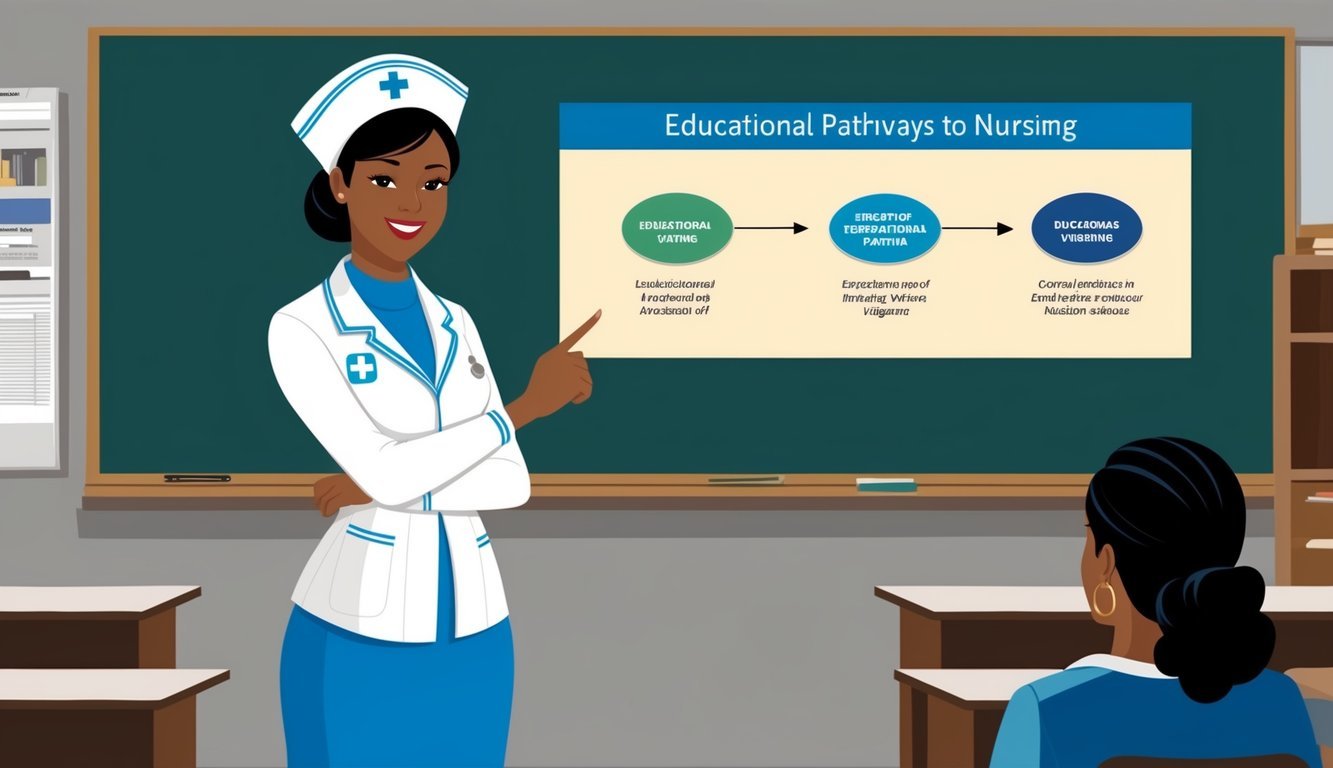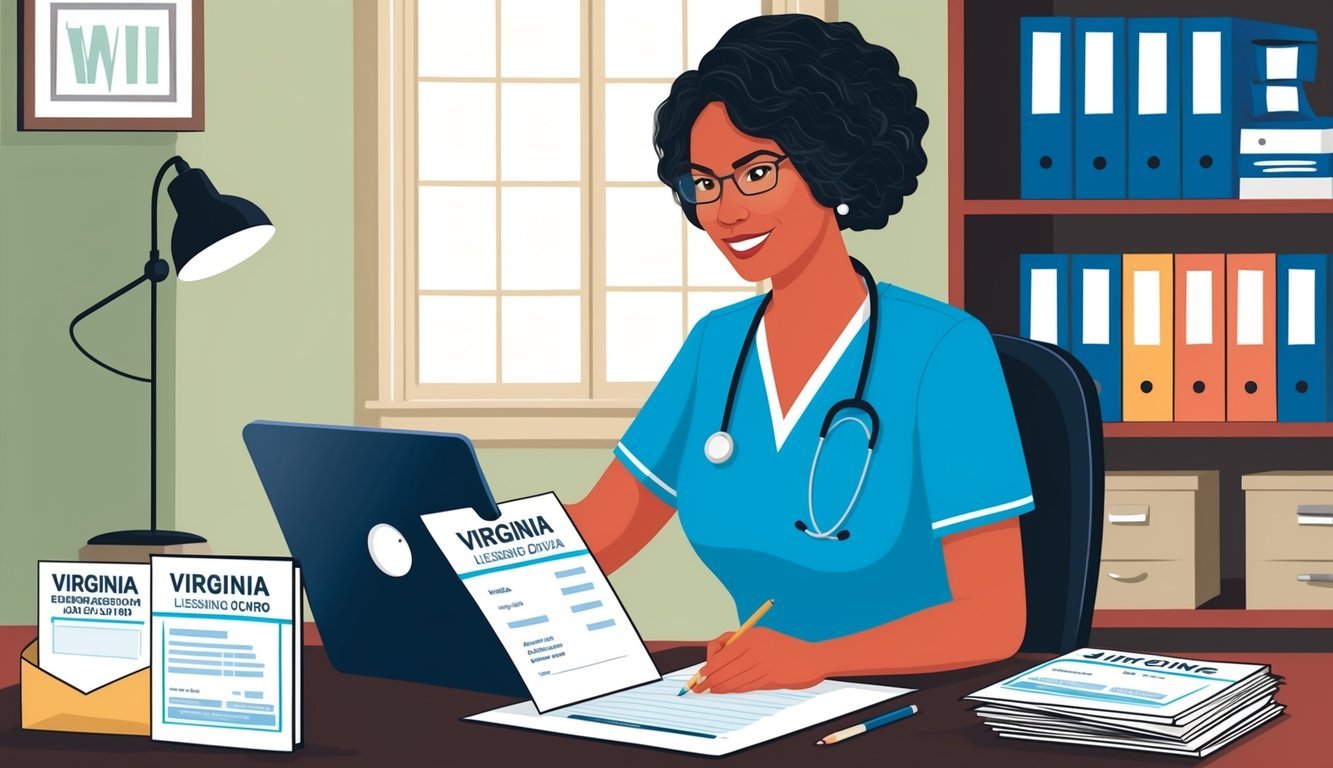Becoming a nurse in Virginia is an exciting journey that offers you the chance to make a real difference in people’s lives.
To start this path, you need to earn either an associate degree or a bachelor of science degree in nursing, pass the NCLEX-RN exam, and apply for a state nursing license.
This process may seem challenging, but knowing the steps involved can help you stay focused and motivated.
In Virginia, the demand for qualified nurses is high, providing strong job security and various career opportunities.
From hospitals to community clinics, you can work in different environments that fit your interests and lifestyle.
With the right education and a commitment to your career, you can thrive in the nursing profession.
As you read further, you’ll discover the educational pathways available to you, the licensing requirements to become a Registered Nurse, and resources that can support you throughout your career.
Key Takeaways
- Completing the right education is essential for your nursing career.
- You must pass the NCLEX-RN exam to become licensed.
- Ongoing support and professional development are crucial for advancing in nursing.
Understanding the Nursing Profession in Virginia

The nursing profession in Virginia offers diverse roles and strong job prospects.
Understanding these aspects helps you decide on your career path in this field.
Roles of Registered Nurses and Nursing Specialties
Registered Nurses (RNs) play a crucial role in patient care.
They assess patient needs, administer medication, and coordinate with other healthcare professionals.
In Virginia, you can choose various specialties that suit your interests.
Some popular nursing specialties include:
- Nurse Practitioners (NPs): They can diagnose and treat patients, often providing primary care.
- Clinical Nurse Specialists (CNSs): These RNs focus on specific populations or clinical areas, improving patient outcomes.
- Nurse Anesthetists: They administer anesthesia and monitor patients during surgery.
Virginia Nurses Association provides resources and support for professional development.
Joining such organizations can enhance your skills and networking opportunities.
Job Outlook for Nurses in Virginia
The job outlook for nurses in Virginia remains strong.
The demand for healthcare services continues to grow, driven by an aging population and increased focus on health.
According to recent data, here are the expected job growth rates for various nursing roles in Virginia:
| Nursing Role | Job Growth Rate |
|---|---|
| Registered Nurses (RNs) | 13% |
| Licensed Practical Nurses (LPNs) | 11% |
| Nurse Practitioners (NPs) | 28% |
These figures highlight the increasing opportunities for nursing jobs.
As a nurse, you have several pathways for career advancement and specialization.
The Virginia job market provides ample chance for you to thrive in your nursing career.
Educational Pathways to Nursing

To pursue a career in nursing, you have several educational pathways to consider.
The right choice often depends on your career goals, time commitment, and financial situation.
Understanding the types of programs available can help you make an informed decision.
Nursing Programs and Degrees
In Virginia, you can choose from multiple nursing programs and degrees.
The most common pathways are:
- Associate Degree in Nursing (ADN): This typically takes two years and prepares you for entry-level RN positions.
- Bachelor of Science in Nursing (BSN): A four-year degree offering advanced training and better job prospects.
- Master of Science in Nursing (MSN): For those interested in advanced practice roles or nursing education, this program usually requires an additional two years after a BSN.
Accelerated BSN programs are also available for those who already hold a degree in another field.
These programs can be completed in 12-18 months, allowing for a quicker transition into nursing.
Top Nursing Schools in Virginia
Several institutions in Virginia are recognized for their quality nursing programs.
Here are some notable options:
| School Name | Degree Offered | Location |
|---|---|---|
| Wytheville Community College | Associate Degree in Nursing (ADN) | Wytheville |
| Averett University | Bachelor of Science in Nursing (BSN) | Danville |
| George Mason University | Bachelor of Science in Nursing (BSN) and MSN | Fairfax |
| Virginia Commonwealth University | Accelerated BSN and MSN | Richmond |
These schools provide strong curricula, clinical experiences, and connections to local healthcare facilities.
Look for programs that offer nursing scholarships and financial aid options to help support your education.
Online Nursing Degree Options
If you need flexibility, consider pursuing an online nursing degree.
Many schools in Virginia offer online programs for both ADN and BSN degrees.
Some key points to consider:
- Flexibility: Online programs often allow you to study at your own pace.
- Hybrid Options: Some programs blend online coursework with in-person clinical experiences.
- Continuing Education: Many institutions offer online continuing education courses for RNs wanting to advance their skills or knowledge.
Research programs such as those offered by the University of Virginia or Old Dominion University for reputable online nursing education.
Licensing Requirements and Application Process

Becoming a nurse in Virginia involves several important steps, including meeting pre-licensure requirements, passing the NCLEX-RN exam, and completing the application for a Virginia nursing license.
Each of these steps plays a critical role in your journey as a nursing professional.
Pre-Licensure Requirements
Before you can apply for a Virginia nursing license, you must meet specific pre-licensure requirements.
First, you need to complete an approved nursing education program.
This program typically includes a minimum of 400 clinical hours of supervised direct client contact.
Next, you will need to undergo a background check.
This involves submitting your fingerprints through a service like Fieldprint VA.
You must also obtain a CES Professional Report if you were educated outside the United States.
For more detailed information, consider visiting the Virginia Board of Nursing website.
Taking the NCLEX-RN Exam
Once you have met the educational and background check requirements, you must pass the NCLEX-RN exam.
This exam tests your knowledge and skills as a nurse.
You will need to register for the exam through Pearson Vue.
After registration, you will receive an Authorization to Test (ATT).
Make sure to schedule your exam promptly, as it can impact your overall application timeline.
It is essential to prepare for the exam by reviewing the guidelines provided by the Virginia Board of Nursing and utilizing NCLEX review resources to ensure you perform well.
Virginia Nursing License Application
After successfully completing your nursing program and passing the NCLEX-RN exam, you can begin the application for your Virginia Nursing License.
You need to submit your application online through the Virginia Department of Health’s website.
The application typically requires documentation such as proof of your nursing education, exam results, and a completed background check.
There is also a fee associated with the license application, which you must pay during the submission process.
License processing times range from 30 to 45 business days, so plan accordingly.
For specific guidelines, refer to the Virginia Board of Nursing – Apply for License page.
Maintaining and Advancing Your Nursing Career
To ensure you thrive in your nursing career, you need to focus on ongoing education and explore various advancement opportunities.
This will not only help you stay updated with the latest practices but also enhance your career prospects.
Continued Competency Requirements
In Virginia, maintaining your nursing license requires meeting continued competency standards.
You must complete 30 hours of continuing education (CE) every two years.
This includes specific hours in topics like pharmacology and ethics.
You can fulfill these requirements through various means:
- Formal continuing education courses (CNE)
- Workshops and seminars
- Online courses
Additionally, participating in direct client care hours is crucial, as it reinforces your practical skills and knowledge.
For nurses under the Nurse Licensure Compact, maintaining your license in your home state fulfills the requirements in other participating states, streamlining the process for multi-state practice.
Opportunities for Advancement in Nursing
Advancing your career offers the potential for higher salaries and specialized roles.
Some common pathways include earning advanced practice degrees, such as a Master of Science in Nursing (MSN) or pursuing certifications in areas like pediatric nursing or critical care.
Consider these advancement options:
- Clinical Nurse Specialist
- Nurse Practitioner
- Nursing Educator
You can also explore leadership roles, such as nursing management or hospital administration.
Networking and mentorship can further assist you in identifying and pursuing these opportunities.
For more guidance, check resources on nursing advancement options.
Professional Resources and Support Networks

As you pursue a nursing career in Virginia, various resources and support networks can help you along the way.
Virginia Board of Nursing
This board is essential for regulating nursing practice in Virginia.
They provide guidance on obtaining your nursing license and maintaining it.
For detailed information, visit the Virginia Board of Nursing.
Virginia Nurses Association
The Virginia Nurses Association (VNA) offers resources for continuing education and professional development.
The VNA hosts annual workshops and meetings to keep you connected with other professionals.
For more insights, check their official page.
Key Contacts
- Claire Morris, RN, LNHA: Executive Director of the Virginia Board of Nursing.
- Cynthia M. Swineford, MSN, RN, CNE: VNA President, provides direction in nursing affairs.
Nurse Licensure Compact
If you hold a nursing license in another compact state, you may be eligible to practice in Virginia without a new license.
This can simplify your transition and expand your job opportunities.
Networking Opportunities
Building relationships with colleagues is important.
Engaging with local nursing organizations and attending events can help you gain knowledge and improve your skills.
Frequently Asked Questions

Here are some common questions and answers about becoming a nurse in Virginia.
This section covers requirements, licensing processes, nursing programs, and options for international students.
What are the requirements to become a registered nurse in Virginia?
To become a registered nurse (RN) in Virginia, you need to complete an accredited nursing program.
This could be an Associate Degree in Nursing (ADN) or a Bachelor of Science in Nursing (BSN).
After that, you must pass the NCLEX-RN exam and apply for a nursing license through the Virginia Board of Nursing.
What is the process for obtaining a Virginia nursing license by endorsement?
If you already hold a nursing license from another state and want to practice in Virginia, you can apply for licensure by endorsement.
You need to verify your current license, complete an application with the Virginia Board of Nursing, and pay any associated fees.
A background check will also be part of the process.
What are the Virginia Board of Nursing licensure requirements for foreign-trained nurses?
Foreign-trained nurses must meet specific requirements to obtain a Virginia nursing license.
This includes having their education evaluated for equivalency to U.S. standards.
You will also need to pass the NCLEX-RN exam and prove English proficiency, generally through tests like the TOEFL.
How long is the typical duration of nursing programs in Virginia for becoming an RN?
Typically, an ADN program takes about two years to complete.
Meanwhile, a BSN program usually lasts four years.
Both options include classroom instruction and hands-on clinical practice, preparing you for the nursing profession.
Are there direct admit nursing programs available in Virginia for aspiring nurses?
Yes, many colleges in Virginia offer direct admit nursing programs.
These programs allow students to be accepted into the nursing major right out of high school.
This ensures a spot in the program without needing to apply again after initial courses.
What are the steps for international students to pursue a nursing career in Virginia?
First, international students must apply to an accredited nursing program in Virginia.
You will need to provide proof of your previous education and meet any language requirements.
After completing your degree, you must pass the NCLEX-RN exam and apply for licensure with the Virginia Board of Nursing.

